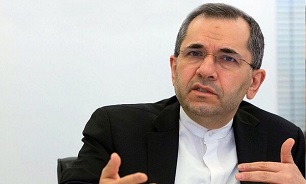No action from JCPOA parties in 2 months to mean 'no political will'
 On the anniversary of the US’ unlawful withdrawal from the 2015 Iran nuclear deal, known as JCPOA, Iran said it plans to cease complying with portions of the agreement to jostle the remaining signatories into putting their words into action regarding the safeguarding of Iran’s economic interests in the face of US sanctions.
On the anniversary of the US’ unlawful withdrawal from the 2015 Iran nuclear deal, known as JCPOA, Iran said it plans to cease complying with portions of the agreement to jostle the remaining signatories into putting their words into action regarding the safeguarding of Iran’s economic interests in the face of US sanctions.
At the same time, President Rouhani stressed that Iran would continue to remain in the agreement and the countermeasures still fall within the framework of the pact; “Our nation should know that we have not withdrawn from the nuclear deal. They shouldn't think that the nuclear deal doesn't exist anymore. Today, we announced a reduction, not withdrawal,” Rouhani said during a televised appearance on Wednesday.
Speaking to the American public broadcaster PBS, Iran’s ambassador to the UN Majid Takht-Ravanchi talked about why Iran waited a whole year since Trump administration pulled out of the JCPOA to announce countermeasures.
“Over the last year, we exercised extreme patience in order to show that Iran is ready, Iran is ready to take extra mile, in order to show that it is sincere in its implementation of the nuclear deal.
But, unfortunately, due to US bullying of even its closest allies, we have not received the economic benefit that we were promised to receive based on the nuclear deal. And then we were left with no other option than to say that, for 60 days, we are going to stop implementing or to cease performance of some of our obligations, voluntary obligations, based on the nuclear deal.
And we will see what will happen during the next 60 days. The window of diplomacy is not closed. We believe that Iran will speak, will negotiate with the partners, the remaining participants of the JCPOA, and we will see what will be the outcome of the negotiations.”
Ambassador, you say that you were left with no other option, but why do you need to enrich uranium at a higher level than 3.67 percent? What's your intentions by doing that — or possibly doing that?
Well, no, for the time being, we are adhering to the JCPOA on the limit of the enrichment, the level of enrichment.
What we have said is, for the next 60 days, we are going just to be free for our stockpile. We are not talking about enriching more than 3.67 percent for the next 60 days.
President Rouhani did say today that you would enrich higher than 3.67 if you don't get those economic incentives, which haven't come so far.
Of course. Of course we will. Of course we will.
The reason is that our partners have had more than enough time, for the last year...to compensate what the Americans have done to the JCPOA.
So if they cannot do it in the next two months, that means that the political will is not there. And then we will act in accordance with our national interests.
Today, President Trump said that he still hoped to meet with Iran's leadership. Does Iran have any interest in meeting with President Trump?
There is — I mean, there is no utility in meeting somebody who carelessly tear apart, you know, an international agreement.
It wasn't an agreement between Iran and the United States. Other countries, the European Union were part of it. So, all of a sudden, we see that the president comes and says, I don't like it because of so many reasons, because the former president took the initiative to sign such an agreement with Iran.
So, how can we trust somebody who carelessly and recklessly do something like this?
Some people who I'm talking to here who are experts on Iran fear that the speech by President Rouhani today will allow hard-liners here in the US and perhaps Israel a stronger case to argue that Iran is not trustworthy.
I think the hard-liners, as our foreign minister has coined it, four B's, Bibi Netanyahu, Bolton, bin Zayed, and bin Salman, they are doing whatever they can, no matter what Iran does.
So it doesn't matter how we are dealing with JCPOA. Their agenda is to provoke. Their agenda is to agitate the situation. Their agenda is to prepare a war against Iran. We are not trying to wage war against anybody, but, definitely, we will defend ourselves no matter what.
Message end/
